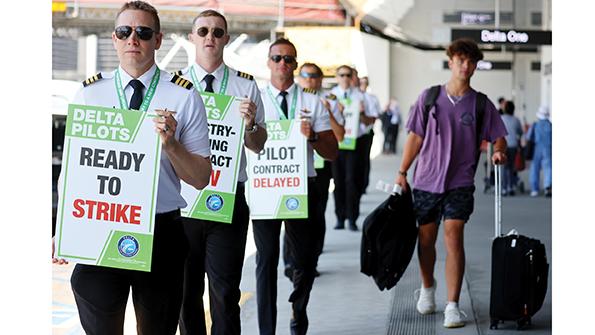
Delta Air Lines pilots have voted to authorize a strike ballot if contract talks continue to stall.
Surging pilot pay expectations are complicating negotiations toward the next round of multiyear contracts at the three large U.S. legacy airlines.
A shortage of regional pilots and higher attrition rates this year have fueled inflationary wage pressures across the industry. As legacy carriers look to hammer out their own post-pandemic contracts, labor unions say they are determined to preserve historical salary margins vis-a-vis smaller carriers.
- United, American crewmembers reject tentative agreements
- Unions view Alaska Airlines pact as catalyst for better pay
Demonstrating the speed at which pay expectations have soared, pilots at American Airlines and United Airlines recently rejected tentative contracts that had been agreed to at the beginning of the summer. Pilots at Delta Air Lines, meanwhile, voted to authorize a strike action, a tactic intended to raise pressure on management to come to the table with a better offer.
While representatives from all three carriers’ unionized pilot groups highlight complaints that include fatigue, work-life balance and scheduling rules, the root of their discontent comes down to a desire for better pay.
“Our board realized that the proposed contract did not meet the goals of membership,” says Dennis Tajer, a spokesman for the Allied Pilots Association (APA), which represents pilots at American Airlines. “Everyone seems to be focused on pay, and we know that’s going to come. It boils down to pilot supply versus demand and the commoditization of pilot pay rates. The fact is, they’re going up.”
The June tentative agreement with American effectively would have raised pay by 12% immediately, a further 5% after one year and 2% more after two years. When compounded over that period, the wage growth would have totaled about 20%, according to Tajer.
One of the major catalysts that led APA’s board to reject the deal was the recently agreed-to contract at Alaska Airlines, which resulted in pay hikes of 22-23% for most pilots. The bulk of the pay hikes were effective on the date of signing in October. According to Tajer, the Alaska contract narrowed the historical pay gap with the three large legacy carriers which APA's board is determined to preserve permanently.
Moving forward, Tajer expressed optimism that progress on a new tentative agreement could be quick if management cooperates. “When a very important transaction for both sides is weighing in the balance, management teams and unions can produce contracts in very quick order,” he says.
The APA’s decision to reject its tentative agreement came just days after United pilots rejected their own tentative agreement, which had included pay hikes of about 14.5% over 18 months, according to the Air Line Pilots Association, International (ALPA), which represents the carrier’s pilots. But representatives from ALPA’s United Airlines Master Executive Council (MEC) said the deal had been expected to fail since American announced its higher offer in June.
“Right as we were negotiating, American came out with a bigger deal, so that derailed the whole thing there,” says Greg Everhard, a spokesman for ALPA’s United MEC. “Our pilots are not going to stand for anything less than an industry-leading contract.”
United was the first mainline U.S. carrier to negotiate a new tentative agreement this year, reached in late May. It now seems to be paying the price for being first out of the gate, as its potential contract has been overtaken by unexpectedly high inflation and surging pay across the industry.
“It’s hard to go off the plank first,” Everhard says. “The marketplace was changing so fast, and so the [tentative agreement] failing was kind of a perfect storm. By the time we got done finishing up the contract, the economics of it were already old, and our pilots picked up on that very quickly.”
United management has told pilots in internal communications, viewed by Aviation Week, that it wants to wait and see “market conditions for pay rates to resolve themselves in the near term” before committing to a new tentative agreement. The ALPA United MEC said in a message to members that the statement indicates the company “appears to be choosing to wait for other airlines” to come to terms with their pilots before proceeding with negotiations.
“That’s frustrating us, hence why we’ve announced our informational picketing campaign,” Everhard says, referring to a series of demonstrations scheduled this month at the carrier’s Denver training center.
Lack of progress in contract negotiations led Delta pilots to authorize a strike ballot in October, a step that ALPA’s Delta MEC says was intended to raise pressure on management as talks toward the company’s first new contract since 2016 drag on. Strike votes are not uncommon during U.S. pilot negotiations, and they do not mean that any work stoppage will actually materialize.
“Delta pilots are frustrated,” says Evan Baach, a spokesman for the Delta ALPA MEC. “We’ve earned an industry-leading contract, and at this point, we’re willing to go the distance—up to and including a strike.”






Comments
Like does it mean the coveted pay scales will be $250,000? $350,00? $450,000?
Are they afraid the sticker shock of extremely high pay will turn off a travelling public already being smacked by outrageous ticket price increases for seats that pack you like a sardine and lousy snacks that cost $10-15.